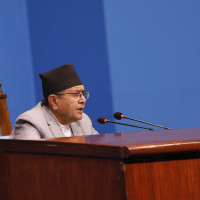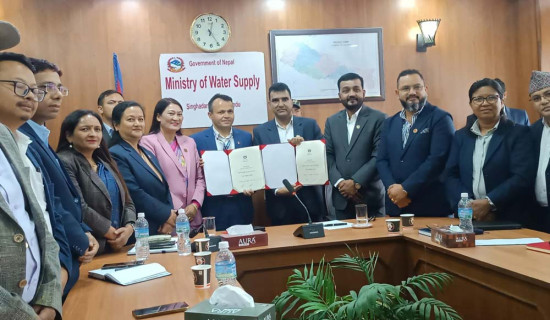- Friday, 9 May 2025
Do not mobilise debt for recurrent expenditure: Commission
By A Staff Reporter,Kathmandu, Apr. 14: The High-Level Economic Reform Advisory Commission has suggested the government not to mobilise debt for recurrent expenditure.
The Commission suggests that short-term treasury bills should be issued to bridge the gap between revenue and expenditure of the government.
Chairman of the Commission and Former Finance Secretary Rameshore Khanal presented the report to Deputy Prime Minister and Minister for Finance Bishnu Prasad Paudel at the Ministry of Finance on Friday.
In the context of the slackness in revenue mobilisation after COVID-19 pandemic, the Commission suggests that the government mobilise internal debt as a special situation to pay for the construction contracts awarded in the past and the outstanding amount of various grants that the government has pledged.
Similarly, the Commission suggests that the government should suspend the grant programmes and new contracts until the payment of the internal debt issued in this way is completed.
The High-Level Commission also suggests that the development bond be fully linked to the development projects, and that the development project for which the bond is being issued equal to the period it will take to complete the project.
The Commission has suggested that long-term projects be selected and development bonds be issued in the context of high liquidity in the banking system, and that only projects that yield higher returns than the interest rate to be paid be selected for construction in loans.
The Commission has also suggested that the government adopt a strategy for mobilising foreign loans with concessional terms to select projects that yield returns.
In the recent context of increasing climate finance supply, it is recommended that a special desk be established in the Ministry of Finance or the National Planning Commission with experts in this field to conduct regular studies and monitoring in this regard and that projects suitable for climate finance be selected.
Similarly, the Commission has suggested that projects that yield high returns and require a higher budget should be implemented in public-private partnership and foreign investment solicited.
"The interest rate is lower when mobilising loans from the international financial market when the credit rating is better. Therefore, improving policy stability, budgets, and plan implementation matter in this regard," it said.
When the National Natural Resources and Finance Commission sets the internal debt limit, it is appropriate to set the net internal debt limit by subtracting the payments due that year from the total internal debt, the report read.

















